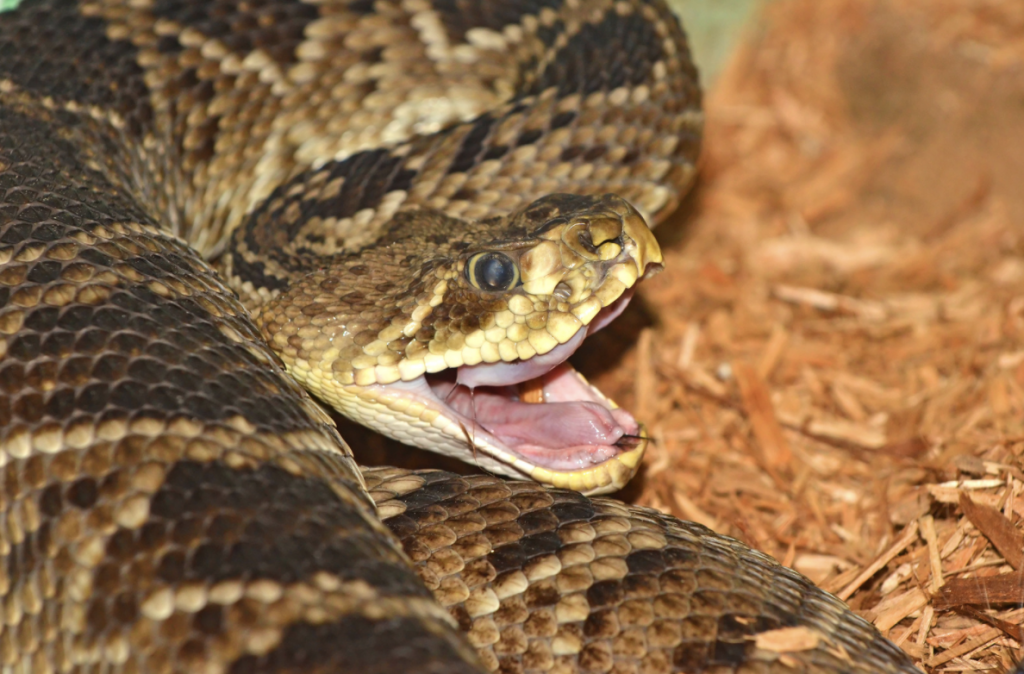Camping is exciting, but a snake bit can ruin your trip. I was wondering how safe my tent is after seeing a rattlesnake once near my campsite. I was scared to death, not gonna lie.

After 5+ hours of research, here’s what I found:
A tent is technically not snake-proof. However, instances of snakes biting through tents or getting into tents are extremely rare. Moreover, snakes are unlikely to attack without being provoked. That being said, you should still take the necessary precautions when camping where snakes are active.
Can Snakes Get Into Your Tent?
The short answer is yes; snakes can get into your tent. However, it is highly unlikely that they would a) want to do so, and b) be able to enter the tent without getting stuck.
Most snakes will shy away from people unless provoked. For instance, if you were on a nature trail and stepped on a snake, they would likely make their presence known by hissing or coming towards you. But if you were at a campsite and a snake noticed movement, they would probably get away from the area on their own.
I think it’s a common misconception that snakes are super aggressive and will attack you. There are breeds, like the bushmaster, that are known to go after people they come across. But they are not found in North America.
In addition, snakes are usually most active in the early mornings as the sun is coming up and warming the ground. In the evenings, most of them go to sleep just like the rest of us. So it’s unlikely that they would even attempt to get into your tent at night.
If a snake were to get into your tent, it would’ve been during daytime and likely due to your tent being exposed in some way. It is important to patch up any slits or holes in your tent and leave it closed up at all times. Even better, just put down your tent during the day, which also protects it from sunlight.
Say you have patched up all holes, and your tent is closed. You may wonder to yourself, “can snakes bite through a tent?”
A snake would likely be unable to fully enter the tent if it were to try to bite through it. It would probably get stuck in the process and not be able to go any further. This is another reason for you to feel more secure during camping.
How Often Do Snakes Bite Campers, and Why?
Besides learning about snakes’ habits, let’s look at some statistics.
According to the Center for Disease Control (CDC), it’s very rare to get bitten by a venomous snake, let alone killed by it:
- 7,000 to 8,000 people get bit by a venomous snake each year in the USA. That’s a tiny percentage of the 40 million campers each year.
- Five people die as a result of a venomous snake bite each year in the USA
So you are more likely to get injured doing almost anything else than getting bit by a snake while camping.
Furthermore, in looking at this article from the Western Journal of Medicine, you learn that snakes rarely bite above the ankle unless provoked and do so most typically in the afternoon. Additionally, you’ll find this quote:
“Snakebites usually occur in young men in their third decade of life who have a blood alcohol concentration of more than 0.1 %. Often they have been handling or attempting to feed a pet rattlesnake and have sustained a bite on the index finger.”
And I know you may have heard of news like this:
Avid camper and outdoorsman Kyle Dickman, was out hiking with his family in Yosemite when a rattlesnake bit him. It took several hours for him to get the appropriate help he needed, and he was close to losing his leg as a result.
It may sound scary and fateful, but a few factors came into play. First of all, they were hiking in the west (prime area for rattlesnakes), in the spring (when snakes come up from hibernation), in the afternoon (when most bites occur), and he was hiking with short socks and exposed ankles.
In 2012, a man celebrating his 50th birthday by camping with family members in Missouri died after being bitten by a Copperhead snake. He had complained of chest pain for several days, which was ultimately the cause of his death. But he also had an underlying heart condition that was exacerbated by the snake bite.
When the bite happened, the man was trying to get the snake out of their tent. The snake had made its way inside while it was open. Though snakes often don’t go after a person, they will when provoked or cornered. In this instance, the snake bit the man’s finger when he reached towards it to remove it from the tent.
Thus, it’s critical to remember that though snakes rarely attack, you should still follow certain guidelines to ensure your safety.
How To Snake-Proof Your Tent and Campsite
To make sure you don’t become the protagonist in any of those stories, you should take active measures in avoiding snake encounters in your tent.
These actions will keep snakes away from your campsite:
- Zip up your tent: Each time you enter and leave your tent, make sure you zip it up behind you immediately. You don’t want anything to get in when you aren’t paying attention.
- Clean up your campsite: Snakes won’t come for your food, but they will come for other animals that want your food. Make sure that all items are properly disposed of and stored in tight-sealing containers.
- Watch out for hiding spaces: Snakes typically take shelter in dark areas. If you have a pile of firewood, pay extra attention when moving those pieces. You may uncover a snake or other critter in the stack.
- Elevate your site: If at all possible, store your items off of the ground floor. And consider placing your tent a bit off the ground. You can get a tent cot for this. The space creates a barrier between critters and your tent, making it harder for them to get in.
There are some great products out there for repelling snakes at campsites, but they aren’t always necessary. If you are still concerned, you can put white vinegar around your tent. Snakes hate vinegar and won’t go near it.
Another option is to pull the hair from your hairbrush and put it around your tent. Snakes will acknowledge the human scent and stay away.
You can also bring fabric softener sheets and put them around your campsite, as snakes don’t do well with the fragrance they give off and won’t come around them.
What To Do if You See a Snake Outside Your Tent
Even with the best precautions, you may see a snake from time to time. The most important thing to remember is that they don’t want to be around you, just like you don’t want to be around them. So remain calm.
Nearly every time, a snake will move away from the area once they notice you from a safe distance. This doesn’t mean you should make noise or sudden movements to make them aware of your presence. That will only cause them to think you are hostile and increase the likelihood of an attack .
Instead, if you are a safe distance away (remember that snakes can strike as far as half of their body size), remain still and allow the snake to leave. If you are too close to the snake, move very slowly and steadily away from it and allow it to leave the area.
You never want to corner a snake. But if you got yourself into that situation unintentionally, it’s better to stay completely still to not provoke it. If it moves towards you, move as slowly and steadily away as possible.
You can kind of tell whether a snake is venomous by seeing if they have a pit in between their eyes, among other characteristics. But unless you are a professional, it’s much safer to assume all snakes are venomous.
If you happen to find a snake inside your tent, your best bet is to allow it to leave on its own accord. This is the safest route for all involved. Chemical snake repellents are not good options as they don’t typically work, and, in an instance like this, you want something guaranteed to be effective without provoking the snake.
There are many snake traps on the market, but these are best left to professionals. If you find yourself needing to use one, be sure you have long rubber gloves to help remove the snake after you’ve successfully trapped it. Additionally, make sure you are with someone else, and you have quick and easy access to medical care.














